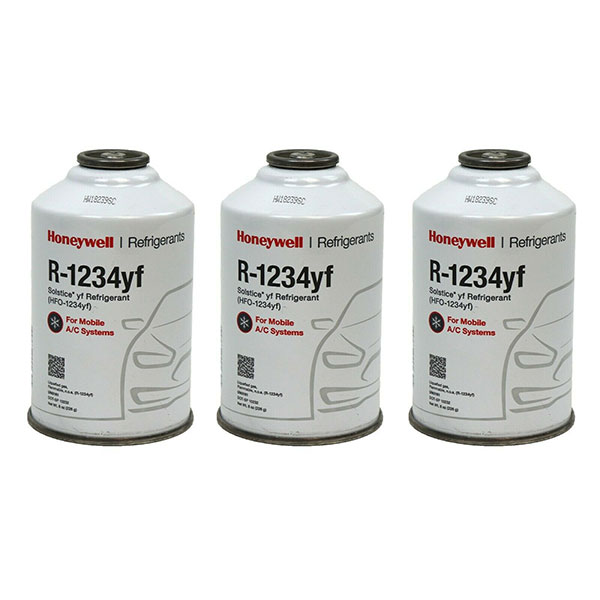What Does 1234YF Refrigerant Mean For Your Vehicle’s Air Conditioning System?
A big change has been taking place in automotive technology over the past several years as it relates to air conditioning. Gone are the days of FREON and 134r refrigerant, which would cause significant damage to our environment when leaked. The new refrigerant is called 1234yf practically solves the environmental concerns with vehicle air conditioning systems. Though it does come with a cost…
Why Are Vehicles Moving To A New Refrigerant?
Cars & trucks before the 1990’s would use R12, which we refer to as FREON, as the refrigerant to keep you cool. However the chemicals in R12 were incredibly toxic to our air and was a major factor in greenhouse gasses in our air. These gasses are measured using what’s called Global Warming Potential (GWP).

To give you an idea on the differences in the global warming potential a single carbon dioxide molecule has a GWP of 1, and is the baseline for measurement. The original FREON, or R12, from the 1930’s had a GWP value of 11,000. To put that in perspective one pound of Freon has the same greenhouse gases as 11,000 pounds of Co2.
In the 1990’s car manufacturers transitioned over from R12 to 134a, which was better all around. The systems were more efficient, needed less maintenance, leaked less, and brought down the GWP to just about 1500. And for the past 30 years we have been enjoying cool air in our cars & trucks for a lot lower cost to the environment.
Fast forward to 2013, GM rolled out the first vehicle using a new refrigerant, 1234YF. The new 1234YF is an incredibly efficient refrigerant that requires just a fraction of of the coolant of earlier systems and brings down the GWP value to just three. That’s right, if you have newer vehicle your AC system has practically no impact on the environment.
Since GM introduced that first vehicle with 1234YF, all other manufacturers have followed suit and transitioned their air conditioning systems over to 1234YF. The US’s Environmental Protection Agency (EPA) is requiring all new vehicles in the US to use 1234YF. So, if you have a car that’s less than 5 years old, there’s a very good chance what’s keeping you cool on your drive is great for the environment. However everything has a cost, keep reading to learn more.
The Good & Bad Of 1234YF Refrigerant

Unfortunately with all the benefits 1234YF offers, there is just one major drawback… cost. 1234YF costs a staggering 10 times as much as the older 134a. Meaning when your mechanic would normally charge around $20 for refrigerant when servicing your vehicle’s AC system, they are now going to be forced to charge nearly $200!
Keep in mind, your mechanic didn’t get more expensive for the services they preform, but the materials your car requires just went up big time.
For that 10x increase in cost, there are several benefits that you’ll enjoy:
- 1234YF has practically no negative impact on the environment
- During service your mechanic will be able to recapture over 95% of the refrigerant (that means it’s not getting into the air)
- During service the advanced systems will check for any leaks and prevent accidental loss
- The new AC systems are incredibly efficient, which means you need less 1234YF than older 134a. This doesn’t alleviate the higher cost, it does make it a little easier on the wallet.
Turn Key Auto Repair is equipped to handle servicing vehicles with 1234YF systems and is committed to sourcing the most cost effective supplies and passing those savings along to our customers. In fact, when you use one of our many coupons for your car AC service, you can be in and out for a pretty affordable price. When it comes time for service, consider the Myrtle Beach mechanics at Turn Key Auto Repair. We offer fast service at a great rate and we’re always happy to take our time and walk you through any service needed. We’re not happy until you’re happy. Call us at (843) 293-6793 or make an appointment online today!
